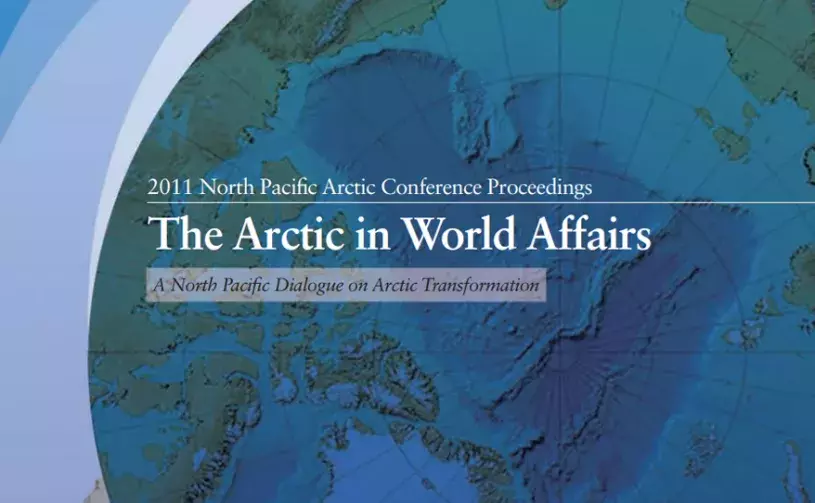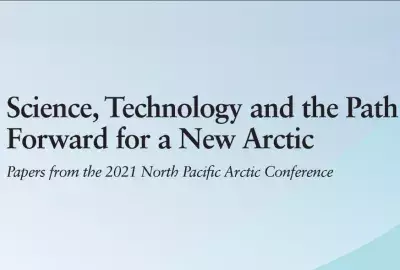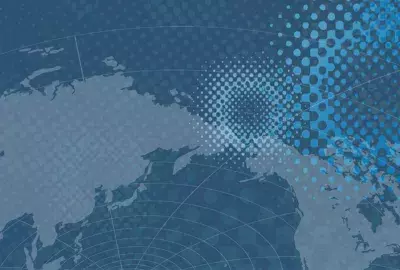Error message

The Arctic in World Affairs: A North Pacific Dialogue on Arctic Transformation addresses four major themes relating to the maritime Arctic: implications of Arctic transformation for the North Pacific, opening of the Northern Sea Route (NSR) and changes in North Pacific transportation and logistics, North Pacific access to Arctic energy resources, and promoting North Pacific cooperation on the governance of Arctic marine shipping and energy resource development. Bringing together prominent Arctic experts from the three North Pacific arctic coastal states (Canada, Russia, and the United States) and three leading North Pacific non-arctic states (China, Japan, and Korea), the book goes beyond generalities; it addresses the details of major concerns in an effort to identify practical solutions to Arctic marine issues and move them from paper to practice.
On implications of Arctic transformation for the North Pacific, the book explores the consequences of the changes across the Arctic in a world affairs framework, within a governance framework for the North Pacific nations. The consequences of climate and environmental changes and the realities of globalization are explored, as well as the implications of these changes of Arctic and non-Arctic countries and indigenous and other peoples of the North.
On opening of the NSR and changes in North Pacific transportation and logistics, the book reviews, in considerable detail, the implications of the opening of the Arctic near-continent seaways, particularly along the NSR. The potential for maritime operations along the NSR has substantially increased because the annual minimum of the extent of Arctic sea ice for 2011 is only 50% of what it was only 35 years earlier, a reduction in extent that is the lowest in 10,000 years and a first in modern human history.
On North Pacific access to Arctic energy resources, the book addresses the implications of the strategic importance of Arctic oil and gas for energy security in the North Pacific. The Arctic region is likely to contain substantial undiscovered hydrocarbon reserves that are projected to include about 13% of the world's undiscovered oil reserves and 30% of its natural gas. It has been noted that the major parts of these oil reserves are close to Alaska's coast, while practically all the natural gas reserves are near Russia's shores, with over 90% on the Yamal Peninsula. Overall, more than 60% of Arctic oil and gas resources are deposited in areas that belong to or are claimed by the Russian Federation.
On promoting North Pacific cooperation on the governance of Arctic marine shipping and energy resource development, the book examines the implications of major international governance issues for access to and use of the three major Arctic routes: the Bering Strait, Northwest Passage and NSR.
The book underscores the many ways in which the Arctic is changing and the challenges and opportunities that this represents: There is increasing interaction and feedback between the regions of the Northern Hemisphere and the Arctic, with consequences for climate change, ecosystems, human health, economic and resource development, and societies. This volume explores these interactions.
The Arctic in World Affairs: A North Pacific Dialogue on Arctic Transformation addresses four major themes relating to the maritime Arctic: implications of Arctic transformation for the North Pacific, opening of the Northern Sea Route (NSR) and changes in North Pacific transportation and logistics, North Pacific access to Arctic energy resources, and promoting North Pacific cooperation on the governance of Arctic marine shipping and energy resource development. Bringing together prominent Arctic experts from the three North Pacific arctic coastal states (Canada, Russia, and the United States) and three leading North Pacific non-arctic states (China, Japan, and Korea), the book goes beyond generalities; it addresses the details of major concerns in an effort to identify practical solutions to Arctic marine issues and move them from paper to practice.
On implications of Arctic transformation for the North Pacific, the book explores the consequences of the changes across the Arctic in a world affairs framework, within a governance framework for the North Pacific nations. The consequences of climate and environmental changes and the realities of globalization are explored, as well as the implications of these changes of Arctic and non-Arctic countries and indigenous and other peoples of the North.
On opening of the NSR and changes in North Pacific transportation and logistics, the book reviews, in considerable detail, the implications of the opening of the Arctic near-continent seaways, particularly along the NSR. The potential for maritime operations along the NSR has substantially increased because the annual minimum of the extent of Arctic sea ice for 2011 is only 50% of what it was only 35 years earlier, a reduction in extent that is the lowest in 10,000 years and a first in modern human history.
On North Pacific access to Arctic energy resources, the book addresses the implications of the strategic importance of Arctic oil and gas for energy security in the North Pacific. The Arctic region is likely to contain substantial undiscovered hydrocarbon reserves that are projected to include about 13% of the world's undiscovered oil reserves and 30% of its natural gas. It has been noted that the major parts of these oil reserves are close to Alaska's coast, while practically all the natural gas reserves are near Russia's shores, with over 90% on the Yamal Peninsula. Overall, more than 60% of Arctic oil and gas resources are deposited in areas that belong to or are claimed by the Russian Federation.
On promoting North Pacific cooperation on the governance of Arctic marine shipping and energy resource development, the book examines the implications of major international governance issues for access to and use of the three major Arctic routes: the Bering Strait, Northwest Passage and NSR.
The book underscores the many ways in which the Arctic is changing and the challenges and opportunities that this represents: There is increasing interaction and feedback between the regions of the Northern Hemisphere and the Arctic, with consequences for climate change, ecosystems, human health, economic and resource development, and societies. This volume explores these interactions.







